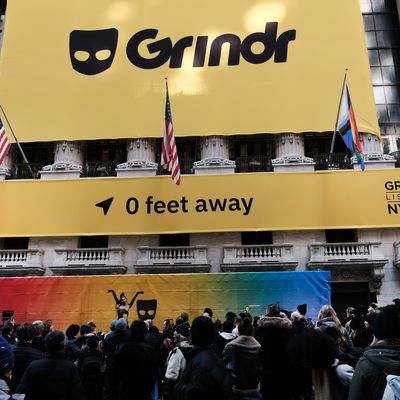
On Friday morning, as Grindr prepared to go public on the New York Stock Exchange, the dating app for the gay and broader queer community threw a party. To celebrate the milestone — Grindr is the biggest LGBTQ+ company to go public and the first to list on the NYSE — Grindr was bringing drag brunch to Wall Street; Lady Bunny and Saucy Santana would be performing outside.
The staid, two-century-old exchange — which normally prohibits even blue jeans and sneakers on its trading floor — suspended its dress code so Grindr’s delegation could ring the opening bell wearing what they felt comfortable in. “We’re really appreciative of the New York Stock Exchange helping us waive some of their rules,” said Grindr’s new CEO, George Arison. “We’ve told our employees no crop tops or flip flops,” said a spokesperson, explaining that the company — whose app is also known for its abundance of thirst-trap photos — still planned to be respectful.
The occasion brought a bit of levity to Wall Street at a time when IPOs and public listings have all but dried up amid a rocky market. “Downtown old school gonna gay it up!” the spokesperson added. Grindr’s move was all the more rare because it went public via a special-purpose acquisition company — a once-trendy maneuver that went out of favor back in 2021. Regulators went after SPACs; Goldman Sachs stopped taking them public; the billionaire hedge-fund manager Bill Ackman shut down his record-setting SPAC after it failed to find a company to acquire. Of the SPACs that did make it public, sob stories abounded. One of the only companies still pursuing the unpopular strategy has been Donald Trump’s social-media firm. It’s been unable to make it out of the gate, waylaid by regulatory scrutiny and other concerns.
Which raises a question: Why did Grindr take the SPAC route when it has become a bit of a dirty word on Wall Street?
“There was a point in time where Tinder and Match were viewed as being unbankable, and there was a concern about headline risk,” says Ray Zage, one of the investors who acquired Grindr in 2020 and a sponsor of the SPAC. Now, Match Group has a nearly $13 billion market cap. “What you really need for a SPAC to be successful is to list a good company at a good price,” he added, noting that Grindr is healthier financially than many of the SPACs that went public only to founder. “Hopefully this will be a standout in why SPACs are a useful tool. When’s the last time you saw a wave of IPOs getting priced, particularly in the technology sector? The reason we’re able to do that is because we have a good transaction.”
Arison says that Grindr has long been misunderstood — perhaps perceived as more of a dick-pic and sex app than a safety and education tool — and that the listing gives it a formal chance to describe its business with each quarterly earnings report. “Grindr started out as a casual dating (a.k.a. hookup) app. There’s no dispute about that; that’s how we all know it,” he says. “We have this really strong brand, but people don’t really know what to connotate it to. Going public will be really good, not just from a market perspective but from a reception perspective.”
Unlike in a traditional IPO, where companies depend on banks to shepherd them through the offering and sell them to Wall Street, SPACs allow companies to bypass much of that process. Other companies that have opted to go public through a SPAC have been “a little off the mainstream,” says Usha Rodrigues, a professor of corporate finance and securities law at the University of Georgia’s School of Law. That includes those with a political bent that might make banks squeamish. (Trump’s SPAC, for one, or the Black Rifle Coffee Company, which sells a “thin blue line” medium roast.) “And it might be that such companies — and Grindr might be one — feel like they can do better controlling more of their destiny rather than pitching to a white-shoe investment bank,” she adds.
Grindr has had its share of controversy in recent years: It was acquired in 2018 by a Chinese company, which had to turn around and sell it after the U.S. raised national-security concerns. Then there was a data-privacy scandal involving the reported outing of a priest based on his location data. Grindr has since stopped sharing such data with advertisers.
Arison says he wondered whether he’d face weird questions or homophobia when he began talking to investors, but Wall Street proved more welcoming than he’d anticipated. “I was very positively surprised by how much less stigma I felt versus what I expected,” says Arison. “Investors were pulling out their phone saying, ‘I’m on Grindr.’”
He sees Grindr’s listing as a symbol of how far the world has come over the past few decades: The New York Stock Exchange was once the site of protests against the high price of AIDS drugs in 1989. “I think it’s no question a sign of progress that you can have a company like us be public,” Arison says.
The shares debuted under the ticker GRND and ended the first day of trading up more than 200 percent.






























